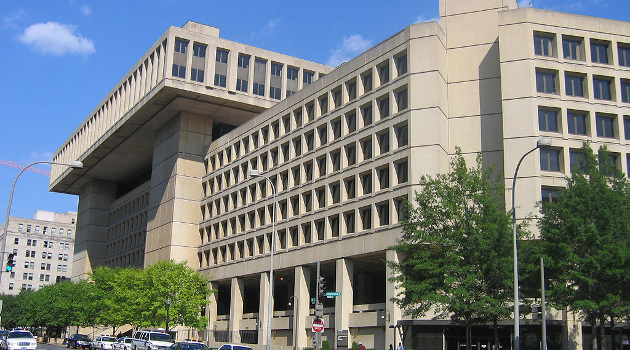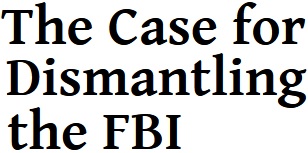Two big-picture assumptions guide my views of law enforcement.
- First, there are some very bad people in the world. To protect the rest of us, I want government to catch, convict, and punish those thieves, rapists, murderers, and other low-life scum.
- Second, government officials have a tendency to misbehave and we should be thankful that America’s Founding Fathers bequeathed us a Constitution that protects our liberties.
In other words, there’s a balancing act.
Many people belong in jail, but I’m glad we have the presumption of innocence, protection against unjust searches, and all sorts of due process legal protections and oversight policies that make it hard for the government to mistreat us or put us in jail (my views even led me to side with Ruth Bader Ginsburg over Clarence Thomas on one occasion).
Let’s consider what happens when law enforcement does not respect that balancing act. In this case, we’re going to look at misbehavior by the Federal Bureau of Investigation.
Here are excerpts from a remarkable story by Michael Finnegan of the Los Angeles Times.
The privacy invasion was vast when FBI agents drilled and pried their way into 1,400 safe-deposit boxes at the U.S. Private Vaults store in Beverly Hills. They rummaged through personal belongings of a jazz saxophone player, an interior designer, a retired doctor, a flooring contractor, two Century City lawyers and hundreds of others. Agents took photos and videos of pay stubs, password lists, credit cards, a prenuptial agreement, immigration and vaccination records, bank statements, heirlooms and a will, court records show. …It took five days for scores of agents to fill their evidence bags with the bounty: More than $86 million in cash and a bonanza of gold, silver, rare coins, gem-studded jewelry and enough Rolex and Cartier watches to stock a boutique.
Here are some more details.
The key thing to understand is that what happened with the FBI wasn’t a heat-of-the-moment mistake, like we saw with law enforcement in Uvalde, Texas.
The bureaucrats at the FBI and the U.S. attorney’s office explicitly planned to act in a dishonorable fashion.
…newly unsealed court documents show that the FBI and U.S. attorney’s office in Los Angeles got their warrant for that raid by misleading the judge who approved it. They omitted from their warrant request a central part of the FBI’s plan: Permanent confiscation of everything inside every box containing at least $5,000 in cash or goods, a senior FBI agent recently testified. …The failure to disclose the confiscation plan in the warrant request came to light in FBI documents and depositions of agents in a class-action lawsuit by box holders who say the raid violated their rights. …“The government did not know what was in those boxes, who owned them, or what, if anything, those people had done,” Robert Frommer, a lawyer who represents nearly 400 box holders in the class-action case, wrote in court papers. “That’s why the warrant application did not even attempt to argue there was probable cause to seize and forfeit box renters’ property.” …The plaintiffs in the class-action suit have asked U.S. District Judge R. Gary Klausner to declare the raid unconstitutional. If he grants the request, it could force the FBI to return millions of dollars to box holders whose assets it has tried to confiscate. It could also spoil an unknown number of criminal investigations by blocking prosecutors from using any evidence or information acquired in the raid, including guns and drugs. …The 4th Amendment protects people against “unreasonable searches and seizures.” It requires the government to get a warrant by showing in a sworn statement that it has probable cause to believe that a particular place needs to be searched and describing specific people or things to be seized.
In an article for the Federalist, Evita Duffy finds the FBI’s actions to be very disturbing.
…allegations of FBI corruption and hubris are coming to light after a lawsuit last week revealed FBI agents misled a judge so they could illegally seize and withhold property from innocent American citizens. Agents took more than $86 million in cash, jewelry, and gold from 1,400 safe deposit boxes during the raid of a Beverly Hills vault company in March 2021. …the hundreds of citizens whose assets were seized by the FBI are not suspected of any crimes, according to court documents. ….After the raid, the feds demanded that box holders submit to an investigation before having their possessions returned. …as the Institute for Justice points out, the government had no right to seize their property and force them to prove their innocence in the first place.
Ms. Duffy’s article also lists other examples of FBI misbehavior.
And that pattern helps to explain why Charles Cooke of National Review argues it may be time for radical change.
Since 1935 — and, indeed, even before that, back when it was just the Bureau of Investigation — it has been a violent, expansionist, self-aggrandizing, and careless outfit… I now think that the FBI ought to be destroyed from the ground up. End it. Disassemble it. Dissolve it. Repeal its charter, evacuate its building, spoliate its budget and supplies. …Bit by bit, year by year, case by case, the FBI has turned itself into a sort of unmoored Super Police Force, which, despite being nominally accountable to the executive branch, is “independent” from political control. In essence, the FBI’s pernicious tendency toward empire-building is of a piece with that exhibited by the rest of the modern federal government… In the heart of its capital city, the United States now has a bureau that intervenes with impunity in our ideological and partisan disputes; that has developed a massive, statutorily unwarranted intelligence-collection wing; and that has never managed to escape the paranoia and corruption of its execrable, tyrannical founder.
I suspect that few if any policymakers will want to follow Cooke’s advice.
But why not at least have some sort of adverse consequences for the bureaucrats who lied? Have any of the FBI officials been fired or charged with lying to the court? Has anyone in the U.S. attorney’s office lost their license to practice law?
The answer almost surely is no. It seems there are never negative consequences when bureaucrats and other public officials misbehave.
P.S. There’s a actually a third big-picture assumption that guides my views on law enforcement, and that’s the notion that there should be far fewer laws (for examples, see here, here, and here).
P.P.S. Heck, I’ll add a fourth big-picture assumption, which is that governments should not use law enforcement as a means of generating extra revenue. That approach leads to terrible outcomes (and understandable reactions).
———
Image credit: Aude | CC BY-SA 3.0.




